#Saying that humans can derive morality from themselves when there have been civilizations where murder and oppression
Explore tagged Tumblr posts
Text
When 20 years ago atheists said that the decrease in religion (*cough* Christianity *cough*) would lead to a more enlightened society are suddenly concerned about the slow moving ball of Western Society collapsing, authoritarianism rising and political unrest on a level the world has not seen for a very long time.
sigh
#Islam will take the place that Christianity once had if Christians are not careful#the new atheist movement has collapsed because they realize their arguments have no grounding and are just emotional arguments#the reason we believe that human rights is important is because Christianity establishes that all humans are made in the image of God#and we have rights that cannot be taken away from us#what happens when people stop believing that and think their rights originate from the government?#authoritarianism. All those rallies over human rights find their roots in Christianity and only Christianity#Saying that humans can derive morality from themselves when there have been civilizations where murder and oppression#are normal everyday things#yes the bible did have rules concerning slavery but the rules are more along the lines of indentured servitude than the type of slavery#we had here in America#The west had collectively said slavery is bad#but slavery still happens and there are people still fighting it#why? why fight when your beliefs says morality is subjective ?#There must be an objective standard and must be unchanging#for any kind of good to happen#Christianity#religion#morality#politics#new atheism
10 notes
·
View notes
Text
i read twisted road to genocide by henri zukier today. the original published paper published in 1994.
it was an interesting read in a couple ways i hadn’t expected. while i feel that its portrayal of functionalism wasn’t exactly fair — functionalists are (to my knowledge and limited methodological expertise) mostly not ‘fluke historians’ and i feel a lot of this paper could have been written in a way that it would fit the archetypal functionalist canon, or at least the newer groupshift synthesis — there still were a lot of rebuttals of rhetoric that exists now still in some shape or form. turns out that the ‘financial anxiety’ type of apologia has existed for a long time, as noted under the ‘economic hardships’ section in the enumeration of various attempts to explain away necessary insights about the holocaust. i don’t think one can really say that ‘history repeats itself’ (or could be at risk to) in a methodologically sound sense, but it was certainly a great overview overview of rebuttals of those who would seek to replicate its horrors with the qualities of balance in cadence and formulaism that i find lacking in many papers. i will probably send it to family too since so far i’ve had little success in convincing anyone but my siblings of the structural complicity that was present in general but especially in the netherlands specifically. hopefully a well-cited academical source not written by the family’s problem child might do more to sway them. i visited the ‘resistance museum’ in amsterdam last summer. i kind of knew what to expect but it was disheartening to see it match the propaganda (mostly in the form of fictional quasi-historical narratives read to children in my circles, including me) in which a certain volksgeist of lionised mass resistance (of protestant bent) was attributed to the netherlands which seems largely unsusceptible to anything in the realm of coherent histiography. this holds true even with the elucidation that many ministers preaching against the nazis and collaboration were also communists (who in this museum were framed as ‘socialists’ to be equated with the ‘national-socialists’, and therefore any and all communism in any advocates at all was erased) with every present piece of history (clippings of newspapers, pamphlets, photographs, and so on and so forth) framed with the appropriate text to soothe the sensibilities of visitors who were seemingly presumed to be gentile and generally culturally christian (and therefore, not queer or communist) and to appropriate both self-defense of targeted communities as well as leftist resistance (which of course largely overlapped) to this particular contingent.
no mention was made of the connections between say, calvinism and the general complicity of civil servants in doing the administrative work — wordly powers are not to be questioned, as all power derives from god according to paul of tarsus — that precipitated the majority of jewish people in the netherlands being murdered, with one of the highest death rates per capita in europe. while the netherlands wasn’t mentioned in this article, denmark was, which largely appears to have exhibited the opposite qualities in at least the bureaucracy and thus also largely yielded inverse results. there is more to say on this with regards to the dutch history of (ethno)religious segregation/pillarisation/federalism and the particular role that dynamic played in our country’s history (and continues to, with some would-be social planners with ambiguous intentions wanting islam to become a new ‘pillar’), but that’s not really what i want to focus on right now.
simply put, i could declare myself content with being more critical than my culturally christian family and the narrative of the culturally christian netherlands in general, especially as i am exiled from these structures and therefore have little personal interest in defending them��� or even from refraining to attack them. however, especially after reading this paper, i have to come to the conclusion that i haven’t really developed beyond these relatively straightforward insights (even if they are rare in my country) in any real way for a few years now. what i think was extremely valuable in this article for me was not only the denunciation of the anti-sociological assertion that good and evil are essential properties of a human being but building on that, that they are ‘nurtured qualities of the mind’. i do not agree with this proposition without caveats for reasons beyond the scope of this piece of writing, however, the way that zukier expounds on this is, i believe, of timeless relevance. the nazis constantly stressed the horrors of their actions and indeed many battalions weeded out those too eager to engage in them — as one example people who volunteered to perform executions were summarily dismissed — but nevertheless viewed them perhaps not even so much as duties in service of some larger goal. however, first, crucially, considerations of such were seen and treated as largely external to any notion of morality or ideology worth considering, which he expounds on at length over the course of the history of nazi germany.
here lies something i think is crucial to any such person or people who see themselves as grand architects of ideology and the future (and i myself have been partial to this at some points): you cannot let yourself become callous to the existence of such forces of which you are not the primary target. there is no excuse for letting orthogonal ideological interests outweigh the threat of mass oppression and violence, especially in a time where such things are emergent again. there is responsibility in what projects one considers themselves part of and in the scope of these projects, to root out such indifference. even in light of certain zionist histiographies who have constructed a new continuity to integrate the holocaust in a historical and metaphysical scheme that leads from there to redemption through the state of israel in the levant (quoting zukier almost verbatim), one cannot allow themselves to be caught into cooperating with this sophistry where to disagree with such narratives must necessarily co-implicate indifference (or even hostility) to the people involved. no antizionist or antitheist schema can permit any form of ideological reductionism or bargaining of the still very real threat of genocide which may very well become institutional in a number of countries in the near future, as it has before.
to acknowledge this much in spite of the muddying of this issue by bad faith actors (whether in the form of zionist genocide enthusiasts or white supremacists and their useful idiots who seek to bargain or deny the holocaust) is necessary for everyone, and i very much also assert this to myself as an un-christian (and queer and trans and so forth) but still nevertheless gentile person. this much is clear regardless of any and all complex geopolitical reasonings which in the scope of this particular issue are really only worth mentioning in the abstract, even if they are very much worth discussing on their own terms— indeed, criticisms must exist which separate the struggle against bigotry from certain imperialist and pro-family agendas and to refuse such actors the monopoly on these issues. i’ll make sure to send this piece to my various academical peers and to discuss this with them to keep in mind even as we strive towards other common goals together— which must be and are by definition synonymous with exactly this refusal to equate the two. however, as established, defining and stating one’s owns interests is hardly enough when it comes to this kind of subject, and failure to do so cannot be tolerated, and this i insist to any fellow adversaries of organised religion who might read this.
4 notes
·
View notes
Text
Philosophical approach to Atheism
General social survey, which is a sociological survey department created by national opinion research center at the University of Chicago. In their statistics claims that in the year 2000, 8 percent of the U.S. population identified themselves as atheists, which grew exponentially to 21 percent in the year 2014 and has gained momentum, since then. Atheism taking its roots, it’s time we ponder over atheistic approach to life. Simply put, it’s a lack of belief in the existence of God or any metaphysical or spiritual being for that matter. But what drives this “lack of belief”? Which, I believe itself is a belief system. Atheist also call themselves rationalist, which in philosophy means a person who ‘regards reason as the chief source and test of knowledge’. Being rationalist, not all atheists deny the existence of a supreme power, some argue the lack of evidence, some call it a hypothesis and some claim that the theist belief stems from evolutionary adaptation for the belief in which God gives purpose to life. Philosophy however, being a study of knowledge, reality and existence has an unbiased take on both atheism and theism.
If theist have the challenge of proving the existence of all an powerful God, Atheists have the burden of solving the problem of abstract concepts that we know is present viz. wisdom, civility, intuition, morality… and many more, The disbelief gives rise to complexity in understanding of innumerable abstract concepts that is derived from the belief in a higher super natural power. Let’s take a look at how atheism explains morality, one of the abstract concepts, possibly the most crucial of all.
Is morality Intelligible?
Morality is one of the factors that distinguish the Human race from rest of the animal kingdom. It determines our methodological approach to good or bad, right or wrong, fair or unfair, just or unjust… the list could go on. An intangible, indefinitive abstract idea that shapes our behavior, way of life and even the law of the land we live in. But what is morality and where does it come from? Well, for theist the answer is simple, a God given gift, something that makes Homo sapiens superior and for some simply the proof that God exists. Let’s talk about the atheistic philosophical approach to morality or/and if morality even exist in an atheistic world view. There are numerous approach to morality in the philosophical realm in a quest to understand or define morality, for instance, the 18th century utilitarian theory put forward by Jeremy Bentham and John Stuart Mill which states that,
“A person ought to act so as to maximize pleasure and minimize pain.”
They stress on the idea that the moral grounds are determined by the outcome of the act. something is morally good if it increases pleasure or decreases pain and bad if it decreases pleasure or increases pain. Sounds like a valid point. But isn’t pleasure subjective, i.e., doesn’t it depend on personal experiences and preferences. If so, why is that something called core morality even exists? Why do we know for sure that killing or rape is definitely wrong? That knowledge stems from our core morality. Even if we, for the sake of argument nod our heads to the definition of morality proposed by atheistic world view and agree to the argument posed, that morality is a product of evolution over time derived by the acts of pleasure and pain, from a robbers perspective robbing is pleasurable does that make stealing morally sound? Or even a murder for that matter? It is inconceivable to accept or relate to the idea that morality or ethics are psychological evolutionary results like there are biological. As Rosenberg Alex, in his book ‘The atheist’s guide to reality’ states,
“Is natural selection so smart that it was able to filter out all the wrong, incorrect, false core moralities and end up with the only one that just happens to be true? Or is it the other way round, Natural selection filtered out all but one core morality, and winning the race is what made the last surviving core morality the right, correct, true one. Which is it? It can’t be either one. The only way out of the puzzle is nihilism.”
In layman language atheism cannot uphold morality, therefore moral nihilism i.e., nothing is morally right or wrong is the only position atheists can hold. Which I believe we all agree to that is not true, morality is very real and it does exist. Not only it exist but also shape the world around us and the denial or inability to even explain the existence of something as basic and influential as morality is what makes me wonder how our rationalist fellow humans reason with the existence of morality.
An argument for God.
An argument generally posed by atheists is the absence of scientific evidences for the existence of God. This particular argument reveals the lack of understanding of science or scientific analysis. Science is the study of observable physical or natural world through observation of structure, behavior and patterns to arrive at a conclusion. It is as ridiculous a question as to expect science to provide us an answer for the purpose of life. It is simply beyond the scope of science. And that is the reason for the existence of a field called philosophy, to deal with intangible concepts. As philosophers are reputed to deal with what science doesn’t, many philosophers have made an attempt to deal with or prove the existence of a uncreated, free willed, all powerful, Intelligent and transcendent being who we know as God. Anselm, a philosopher from Canterbury in 11th century gave an ontological (metaphysics, that deals with nature of being) argument to prove the existence of God. Thomas Aquinas also a theist, nearly 200 years later refuted Anselm’s theory with one of his own, as in philosophy you don’t just disagree; you disagree with an argument of your own. Aquinas presented a five pointer argument to prove the existence of God, which is as follows.
1) Argument of motion
2) Argument of causation
3) Argument of contingency
4) Argument of degree
5) Teleological argument.
The first three arguments deals with cosmology and hence are called cosmological arguments. Aquinas in his argument of motion argues that, If you see a ball moving, subconsciously without giving a thought you know there is a mover, someone who set the ball in motion, which is well explained by the Newtonian law of motion, or we can say that an object in motion has set the ball in motion. But this leads to another mover who has set that object in motion and if we go on that would lead to an infinite regress i.e., a never ending chain of moving objects that has set the next object in motion unless we place a static or stationary mover in the chain of movers. But why are we talking about the movers? Universe as we know is filled with massive moving objects and hence needs a stationary mover, one who has set things in motion. Similarly, in his second argument the argument of causation, he talks about the causes of things that exists around you, everything present has a cause, every effect necessitates a cause, if something ‘caused’ has caused a cause, then, that something requires a cause and that again would lead to an infinite regress (Read that again but slowly). And this chain of causes would again require a being that is uncaused. Who, has begun the process of causation.
Every being in philosophy has been segregated into two categories ‘necessary being’ and ‘contingent being’. Contingent, in other words those whose existence won’t affect the reality as we know it, you and me my friend are contingent. Aquinas in his third argument which is really dramatically similar to the first two arguments in its aim at avoiding infinite regress, states that every contingent being has been caused by another being, and if that being is contingent too, guess what? Infinite regress!!! And to avoid that a necessary being is needed to cause all the contingent beings. Okay! But why is infinite regress such a problem? Well let’s take a practical example of infinite regress, if you ask me for a rupee, and me not having a rupee, asks a friend for the same, and that friend asks another one and the chain goes on, the rupee would practically never reach you, would it?, For the rupee to reach you someone initially has to have the rupee. For the rupee to reach you, have to avoid the infinite regress. Similarly, for the stars and the planet to be in motion, for you to be caused, we have to avoid the infinite regress or nothing would exist, the same way how the rupee would never reach you.
What is happiness without experiencing sorrow? What is relief without pain? Or good in the absence of bad? The argument of degree argues the existence of degrees for properties and states
“Properties comes in degrees,
In order for there to be degree of perfection, there must be
Something perfect against which everything else is measure.
God is the pinnacle of perfection.”
How do we know that an ‘F’ grade is bad? Because we compare it to ‘A’ i.e., something perfect and hence understand the degree of value of the remaining grades. How do we know that a person is good? We compare one’s properties to the perfect being. The last and the most popular of all of Aquinas’s argument the Teleological argument, teleology being the explanation based on an objects purpose of existence. What would come to your mind when you see a smart phone? An intelligently designed object made by its creator keeping its purpose in mind. Now take a look at the human body, every body part in a perfect ratio, 15 trillion cells, 3 billion nucleotide pairs to form one human genome, makes up 79 organs that work together in coordination with the brain and the heart to keep you alive from the day you are born to the day you die. As Stephen J Gould an evolutionary biologist states “Reply the tape a million times… and I doubt that anything like Homo sapiens would ever evolve again.” The human body is a biological and a chemical marvel. This is intelligent design. The same way none of us would assume that the smart phone came into existence without a purpose because of its intelligent design, Aquinas argues the intelligent design of human body or of the universe for that matter can’t simply be purpose less.
Yes, my article is biased towards the existence of God, that’s because the reality is biased towards the existence of God. What’s your take on the arguments… and remember in philosophy you don’t just disagree; you disagree with an argument of your own.
1 note
·
View note
Text
Cultural Atheism: Response To A “None”
By: Anthony Chiozza
Illustration Source: Professor Mark Thornhill granted permission to run his cartoon via email.
Reprint from: 10/16/2017
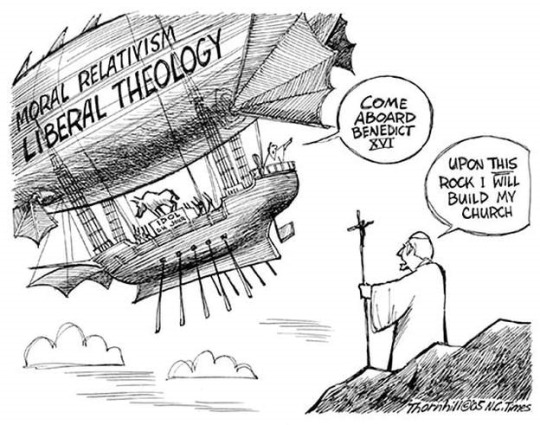
I Am A Sinner About two years ago I wrote a commentary on the current social moral order called, “Cultural Atheism and The Death of The West.” This is a response to one of the comments I received. I was not aware that the piece had any comments at all. I apologize for not responding in a timely manner.There is quite a bit to unpack, so I have broken his comment down into sections in which I respond to his question, or statement. Question: In the spirit of open debate. How are we to know you are not damaged? Response: I am damaged. I am the worst sinner I know. We are all damaged to varying degrees because of the fallen state of man. Whether you accept the pretense of the fall in the Garden of Eden, or not, if one cannot recognize that one's self is inclined towards things that are not good for the self, or others necessarily, then that person will lead a very hard life. I am inclined to stay in a state of Grace as much as possible. I frequent confession as much as I can. Question: In your closing you stated “These poor souls, addicted, brain damaged, and increasingly programming themselves to continue in the downward spiral are truly not fit by their own evolutionary faith.” Where have you been given the moral authority to make this assessment? Response: I am also a poor soul, and in much need of prayers. I am glad you brought this point up because something is in grave need of clarification. I am in no way judging any individual on their internal moral standing with God. I am observing the general actions of society, the rejection of the Church and her Bride Jesus Christ. This results in a judgement based on those external actions compared to God’s Law. Specifically, that moral authority comes from Jesus, when He gave that same authority to Peter with the Keys to Heaven, and to the other apostles as well in the form of forgiving, or retaining sins. The Church, which has been granted the same authority Jesus had, expects me to preach the Truth of Love through actions. I must use the talents God gave me to point to the Truth. I would be a coward otherwise. Faith and Reason Further, I am grateful for your courage to ask the difficult questions. I am well aware that this answer may not suffice to someone that does not believe in dogma. I myself believe that the Logos made Himself Truly manifest as the second person of the Holy Trinity, Jesus Christ. He did this because He does, in fact, love us. My Faith is based not on pure blindness, but also on reason. The Church believes in the use of both Faith and reason. Either one standing alone is a grave error. Thus, my authority to speak on the morality of the West comes from Faith and reason. Part of my reasoning is based on well respected scholars in academia which have confirmed that documents such Ignatius of Antioch’s letters, Polycarp’s letters, and Just Martyrs works are in fact legitimate historical documents. This is further evidence to support the historical Jesus than evidence for someone like Alexander the Great, and other well known historical figures. We also have the writings of the historian Josephus on Jesus and the fall of the Jewish Temple in 70 AD. I am well aware that even with the historical evidence, I am still accepting on Faith that Jesus is in fact who He said He was. The Logos. The Son of God in the flesh. A Thought Experiment Another example of my reasoning is based on the actions of early Catholics. One can reason that Early Christians, the first apostles included, were willing to suffer and die for a belief which essentially outlines eternal joy. However, this religion also made heavy demands on the early Catholics to carry their cross. Catholics can not give into certain illegitimate pleasures. This task of keeping oneself pure, confessing, being humble, and in many cases being butchered as a martyr seems very unreasonable, unless the miracles that converted the pagans were real. Let’s conduct a thought experiment. Let us suppose I walk into a rowdy bar one evening where all kinds of drinking, drug use, and impure behavior is taking place. I stand up on the table, and I yell that everyone should knock it off right now, or they will go to hell. In absence of a miracle to prove my point, I would be thrown out of the bar, and probably beaten for good measure by people that are of an equivalent mindset of the very pagans that were converted in Rome. A good Priest I know gave just this example. Falsifiable Scientific Confirmation & Conversion
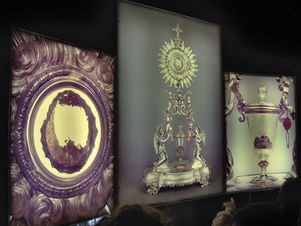
A final and more definitive example of why it is reasonable to believe is because of the Eucharistic miracle in Lanciano, Italy. Then over one thousand years later the example of the Eucharistic miracle in Poland. The Eucharist, otherwise known as what appears to be bread and wine after Consecration, is in fact really the body and blood of Jesus Christ made truly present for us to become one with Him.This is taken on Faith, but God knows that the weakness of our own state of being will prevent us from seeing this Truth. Doubting Thomas needed to put his fingers into Christ's wounds before he would believe. Jesus has done no less for us modern men. Thus, the scientific study conducted by highly skeptical, atheist scientists identified that both sets of DNA from these two separate events were exact matches. This lead to at least one scientist's decision to leave atheism behind and become Catholic. I am aware for most people this is still not enough evidence, through reason, to explain where I get my authority to make such a general judgement on Western society, but I would simply ask them a question in return. Where do you get your authority to make judgments on the moral standing of other individuals' actions, and your own? If one is honest with the self, that is a difficult question to answer. The Founding Fathers Are Not Impeccable Question: I am a Pagan I believe in our country’s preamble to life liberty and the pursuit of happiness. Where is it written that to pursue pleasure is a satanic act? Response: I don’t personally grant any sense of infallibility, and impeccability to the Founding Fathers of the United States. Although some of Christendom's principles were retained regarding some laws when the founders created the Constitution they failed to recognize all of God's Law and authority. Obviously, you can’t murder even though some find it pleasurable, and pursue that very act for their own pleasure. These sets of moreys go back to the Greeks and elsewhere in various civilizations, but these ideas were certainly vastly improved on by Christendom. I consider this lack of clarification on religion, and morality to be one of the Founding Father’s biggest mistakes, and one that will lead to the downfall of this nation. Other scholars of that time in the University system, protestant and Catholic alike agreed with that opinion. Error Has No Rights Question: Are you asserting that life is misery and suffering and that only by understanding that can we be spiritually free? Response: No. That is another heresy Catholicism had to deal with when converting pagans. Pleasure is something we derive from an act, or thought. That act, or thought has to meet right reason. Right reason consists of following certain moral principles laid out by the Church God gave authority to. If I engage in the marital act with my wife in order to be united with her in Love, and to produce children, that act meets right reason. Even if the act is solely for the unitive purpose, because we know she is not at a time of month where she will bear a child, it still meets right reason. If we choose to avoid pregnancy using NFP because of some dire circumstances, which the Church has explained, we are still using right reason. If I go seek pleasure in another woman, destroy my family, and the hearts of my children, this does not meet right reason. If I eat three pieces of cake a day this does not meet right reason. If I eat one small piece a day, enjoy that pleasure, and do not continue to indulge, it meets right reason. God wants us to have pleasure, but just as science has shown regarding the human brain, the pleasure center over indulged, will lead to serious problems. I am sure you know individuals you might have judged to be selfish. What is it that makes them this way? Statement: If so I believe you are headed towards the Buddhist school of thought.
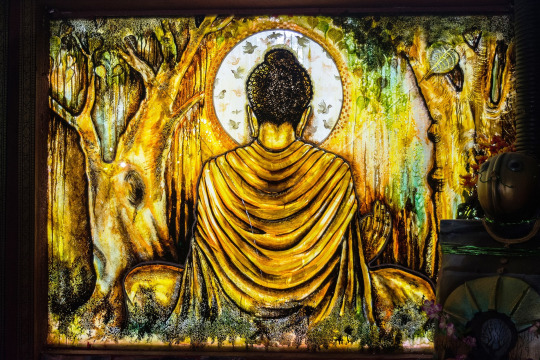
Response: Some Buddhism does overlap with the Catholic Faith, but the more correct way of saying it would be that Buddhism is correct in some aspects, and wrong in many others. The most obvious being that you can’t pull yourself up by your own bootstraps spiritually, because this in itself is an act of pride relying on self. You must ask for the help of something outside of yourself. This is precisely why we see certain archetypes in some of the literature I am sure you have read. Question: Also you state in your article ” This is best demonstrated by simply suggesting that, perhaps, God does exist. Maybe, just maybe, there might be some evidence for that. ” Which would squarely put these people in the camp of agnosticism. Response: I am not saying they are agnostic. The point is that there is typically an anger response rather than a reasoned response. Perhaps they claim atheism, but quietly are agnostic and this is the reason for that emotional lashing out. I am aware of the difference. The general premise of this article is that, practically speaking, most people behave like someone that would truly manifest atheism brought to its logical conclusion philosophically. That conclusion being, I am my moral authority, and those morals can change on a dime to suit my whim. Thus, we have the idea of moral relativism which is expressed on some spectrum by many individuals within society. Statement: Agnostics are not moral relativist. They are people who have chosen to believe much like I have that dogma is not the answer. Dogma in itself is what separates the religions. ( I realize that is merely a statement of fact.) Response: Agnostics certainly are moral relativists. By choosing to believe what you believe to be correct morally, based on your own thoughts, or even the thoughts of other men, is moral relativism from the view of Christ's Church. You may live your life by a certain code of conduct, and even manage not to flip on a dime, but from Christ's lens the rejection of some His Laws is moral relativism. Jung, for example, has some good ideas, but to follow a man that claimed just to be a man as a moral authority seems like a mistake.
The same could be said about my own set of beliefs, given Jesus was not who He said He was. I do believe He is in Fact the Logos made manifest. This is where the very authority comes from that gives me the ability to say, “I am not the one that is the moral relativist.” Further, dogma must exist for the idea of moral relativism to exist outside of a culturally subjective form, because otherwise there is no constant to compare relativistic thought to in its absence. The Faith in the Law we were handed from Moses came from the Trinity. Moses never said this is the Law I created, or this is my Law. He said it was the Law God gave him. Jesus further points out in the New Testament that the Pharisees themselves do not believe that Moses wrote the Old Testament. If they had believed, they would have lead their lives very differently. It can thus be said that the Pharisees were morally relativistic as well. They followed the letter of the Law for their own gain, but not the heart of the Law. I am well aware of the general definition of moral relativism being subjective based on one being a part of a particular culture, but that is clearly not what I am speaking about here. Further, I have listed reasonable criteria to believe the Catholic Church has the authority of God behind it.
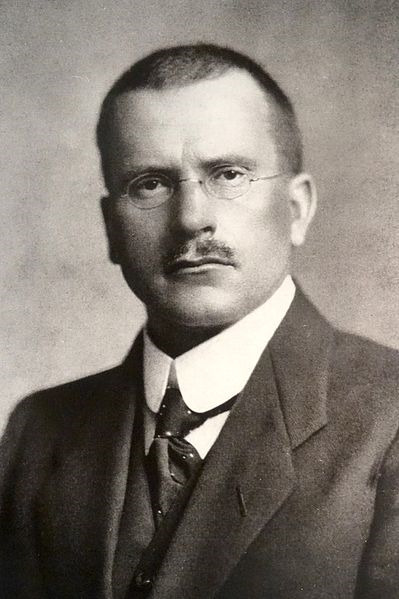
Statement: It is my personal belief that Carl Jung was the most correct when he assigned archetypes to the great humanistic experience. This is to understand that God (which I refer to as the universal energy or spirit) Appears different to all individuals egos based on their current residence in the space time continuum. Meaning the more time and experiences you actually have in this universe the greater your difference of opinion about what God truly is will be from your contemporaries. Agnostics that find a belief in a higher power are not satanist. The only reject dogma in a logical search for a personal contact with a living holy spirit which is the creator or architect of the universe.
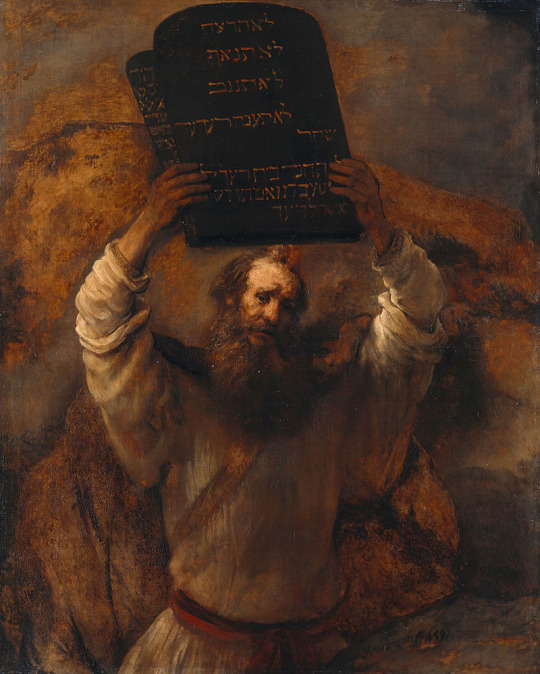
Response: “Any that reject Jesus Christ and His Church are the first born of satan.” This paraphrase was said by some of the early Church Fathers. That does not necessarily mean that someone engaged in the honest exploration of the Truth is the first born of Satan. For example, we would never say that about Saint Augustine on his journey to grasp at the Truth honestly. Surely he was a sinful man like anyone else, but that reference would never be used because he converted. There are many other cases like his, but someone that knows precisely what the Church teaches, has been a witness to the Truth of Love in its fullness. If they continue to openly reject it, they are in fact in Satan’s camp whether they like to admit it to themselves, or not. I don’t say this out of false charity, but out of Love. I know my assessments are correct for other reasons as well. Specifically, when I read the Ten Commandments, and works like that of Thomas Aquinas, I know that by following God's Laws I am fulfilling the greatest expression of God’s Love in the world. I see how breaking that Law is for my pleasure, and how that doing the opposite of those Commandments causes someone else pain. The Church and Scripture further break down those Ten Commandments into their nuanced components that are missed by many that claim to be Christian. There are many things that are actually sinful, which are a part of those Ten Commandments, that many people miss without the guidance of the Church. In short, my pleasure, which does not meet right reason, will cause myself, or another person's pain. Some people may consider it arrogant to tell others how they should consider living their lives. However, if you find yourself on the opposite side of a Christian trying to explain their Faith, and possibly charitably correcting you, of all people, consider two things. One, it is incredibly difficult to actually explain to someone else how they should live their life because you are terrified of the typical reaction you know you are going to receive. You will not win any popularity contests, and find yourself quite friendless. Two, if someone really considers themselves a Christian look at it from Penn’s perspective from comic duo, “Penn and Teller.” Penn says you should be offended if a Christian does not approach you and nicely tell you about their Faith. In light of what they supposedly believe it means they don’t really care about you, and could hardly really be considered a Christian. His exact words were, “How much do you have to hate somebody to not proselytize?”
The fact is I know the Faith I hold to, and the authority it carries, comes with a cross for each individual. Jesus said if we were to follow Him we must pick up our cross. He even said if we love our parents, wives, or children more than Him, which means loving them more than His Law, we are not fit for His Kingdom. You see, if we don’t love His Law first, we can’t really love them because we are not being honest. It is a false love we show, which is simply a going along to get along mentality. Sometimes, the most difficult aspect of following Christ’s Way is charitably correcting our own family, when we know the reaction will not be good no matter how nice we are about it. Choosing to be Catholic is not easy. It makes serious demands, and it takes a lot of courage to constantly assess your own interior motives. It takes further courage to explain the Truth to others. Christ's authority was rejected as well, and He was crucified. How many souls could someone as sinful as myself possibly convince, if Jesus Himself was put to death by the crowd? I expect nothing less for myself. I am a fallen human being myself, in need of Communion, and confession, because even though I see this Truth, I still need God’s help to live His Truth. Please pray for me brothers and sisters. God bless.
youtube
#Atheist#None#AtheistNone#Catholic#Bible#bibleverse#biblequotes#holy bible#conservative#republican#democrats#democrat#repuclicans#maga#president#protestant#infowars#alex jones#red pill
0 notes
Photo


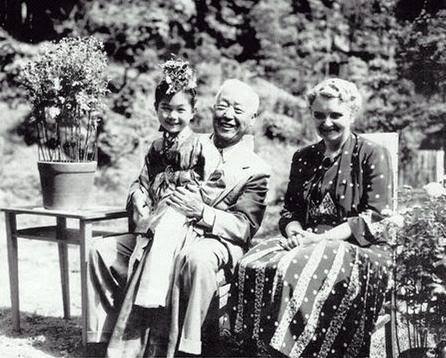
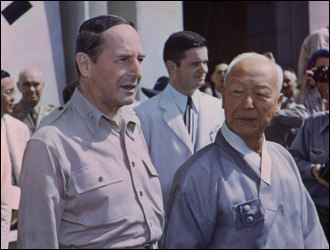
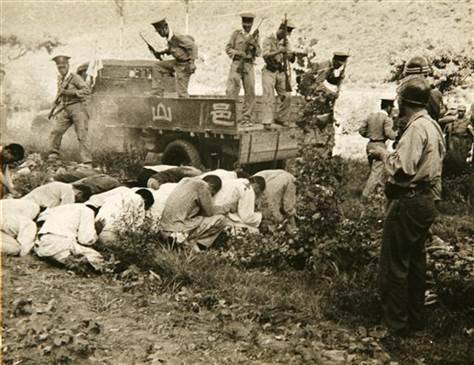
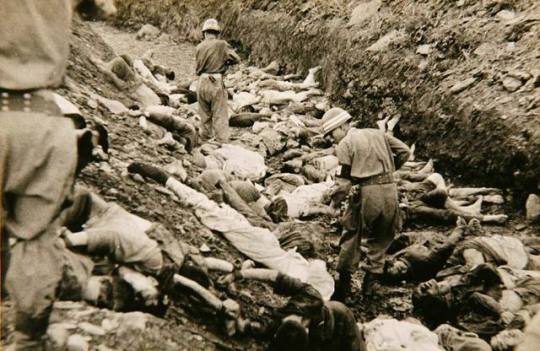

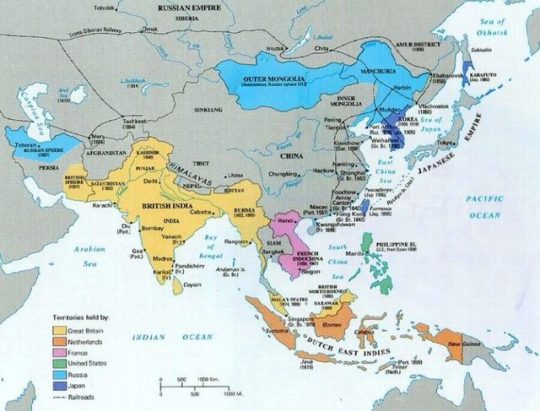

“The story of South Korea’s past starts with a provisional government often forgotten about in history textbooks. The People’s Republic of Korea lasted only from 1945 to 1946, and its capital was in Seoul...As soon as American troops landed on the September of 1945...What immediately occurred afterwards was the abolition of the People’s Republic of Korea by military decree. Officials serving under the government were shot, buildings were bombed, and supposedly “communist-sympathetic” Korean troops stationed in the country were summarily executed in a bloodbath lasting for several months. The United States Army Military Government was established, causing the eruption of mass public outrage at military personnel from the former Japanese Empire serving in office in South Korea.
With haste, the First Republic of Korea, what we now know as South Korea, was declared in 1948. Syngman Rhee was flown abroad a US military aircraft to Tokyo, travelling to Seoul, and was installed as President. Rhee immediately arrested the remaining left-wing opponents in the political arena...Syngman Rhee, as a fierce anti-communist and nationalist who would later be forced into exile by his own citizens.”

“Rhee encouraged his internal security force, headed by his trusted ally, Kim Chang-ryong, to arbitrarily detain people he suspected of having “leftist affiliations” and subject them to days of detainment in labour camps...Syngman Rhee was such a popular leader that he was re-elected four times. During elections, his political opponents often suddenly died or were arrested by South Korea’s internal security force under the suspicion of being “North Korea collaborators”.
(via The secret genocide in South Korea you’ve probably never heard of)

The Korean War: Barbarism Unleashed
“Syngman Rhee was a conservative nationalist who lived in the United States for over four decades after being imprisoned by the Japanese as a young man. The Truman administration brought him back to Korea in October 1945 to lead the new South Korean government. Considering him a “Jeffersonian democrat,” the U.S. Office of Strategic Services believed that Rhee harbored “more of an American point of view than other Korean leader.”
In practice, Rhee exhibited strong autocratic tendencies and relied heavily on Japanese collaborators – in part because he had been out of the country so long. He was elected president in July 1948 by members of the National Assembly, who themselves had been elected on May 10 in a national election marred by boycotts, violence and a climate of terrorism.
“The primary cause of the South Korean insurgency was the ancient curse of average Koreans – the social inequity of land relations and the huge gap between a tiny elite of the rich and the vast majority of the poor.” At the same time Rhee followed American dictates in passing a secret clause agreeing to export rice to Japan and signed contracts allowing American businesses to exploit the So Lim gold mine and take over the Sandong tungsten mine, which was guarded by U.S. troops.”

The director of the U.S. Army’s Department of Transportation stated: “We had a battle mentality. We didn’t have to worry too much if innocent people got hurt. We set up concentration camps outside of town and held strikers there when the jails got too full…. It was war. We recognized it as war and fought it as such.”
By mid-1947, there were almost 22,000 people in jail, nearly twice as many as under the Japanese...Professors and assemblymen were among those tortured in custody. Those branded as communists were dehumanized to the extent that they were seen as unworthy of legal protection...Any red was not considered human...Because we weren’t human, we had no rights.” The scale of repression in South Korea at this time far surpassed that of North Korea. In Mokpo seaport, the bodies of prisoners who had been shot were left on people’s doorsteps as a warning in what became known as the “human flesh distribution case.” A government official defended the practice saying they were the most “vile of communists.”
On war’s eve, seasoned intelligence analyst Lt. Walter Choinski and the South Korean G-2 chief of staff were curiously transferred and a report by distinguished cross recipient Donald Nichols predicting a North Korean attack 72 hours before was suppressed by Willoughby. This contributed to the “intelligence failure” that rendered the North Korean attack of June 25th a “surprise;” a perception that made the war more politically palatable.”

“In mid-September Gen. MacArthur engineered an amphibious landing behind enemy lines at Inchon...“Operation Chromite,” as it was called, was enabled by the seizure of Wolmi-do Island, after it was showered with rockets, bombs and napalm, and by a joint CIA-military operation on Yonghung-do, a small island ten miles from Inchon, where Navy Lt. Eugene Clark obtained vital information for the assault.
The Korean War was replete with atrocities undertaken in violation of the Geneva Convention and international laws of war, which the U.S. ironically had been instrumental in establishing (four Geneva conventions of 1949). Because of the climate of the Cold War and continued North-South division, a proper accounting and reckoning never took place, and many Koreans never were able to obtain justice for unlawful killings of their loved ones.
Whereas in the United States, most of the war atrocities were little discussed or attributed to the communists, under the South Korean military dictatorship, all sympathetic discourse designed to raise awareness of massacres was subject to prosecution. The bereaved families suffered severe discrimination as authorities marginalized them from civil society and politics and placed them under surveillance by the Korean National Police (KNP) and the Korean Central Intelligence Agency...Some of the worst atrocities occurred in the summer of 1950 when South Korean KNP and ROKA units emptied the prisons and shot detainees, dumping the bodies into hastily dug trenches, abandoned mines, or the sea.”
“The most concentrated killing of the war occurred in Taejon, where the KNP slaughtered thousands of leftists under American oversight. According to the historian Bruce Cumings, in July 1950, as “the North Korean People’s Army bore down upon the city of Taejon, south of Seoul,” South Korean police “authorities removed political prisoners from local jails, men and boys along with some women, massacred them, threw them into open pits, and dumped the earth back on them. Somewhere between 4,000 and 7,000 died . . . American officers stood idly by while this slaughter went on, photographing it for their records, but doing nothing to stop it. In September 1950 the Joint Chiefs of Staff decided to keep these photos classified; they were not released until 1999, after a determined effort by a psychologist in New York, Do-Young Lee, whose father had been murdered by southern authorities in August 1950.”
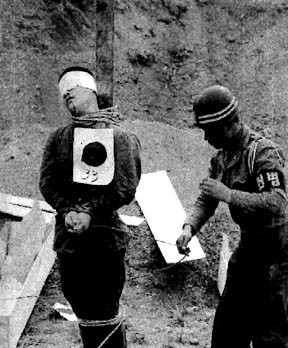
“Donald Nichols, a U.S. Air Force officer who worked in military intelligence, was the embodiment of the dark side of American participation in the Korean War. He issued bounties for the severed body parts and heads of captured communist agents, threw POWs off of helicopters, and recruited defectors for suicidal missions into the North. He also witnessed the systematic torture and massacre of Korean civilians.
In many ways, Nichols was a real-life version of Lieutenant Kurtz, a character in Francis Ford Coppola’s Vietnam War film, Apocalypse Now, who had formed his own private army which engaged in wide-scale torture and eschewed all civilized norms... “Nichols was an uncontrollable commander in a faraway shadow land. He was a highly decorated U.S. Air Force Intelligence officer who ran his own secret war for more than a decade [in which he] lost touch with propriety, with morality, with legality – even with sanity if military psychiatrists are to be believed.
[I]n Nichols, Rhee discovered a back door for delivering intelligence that could influence American policy towards Korea. He referred to the young American as ‘my son Nichols.’” According to Air Force historian Michael Haas, the personal ties that Nichols maintained for more than a decade with a foreign head of state had no parallel in the history of U.S. military operations. Incredibly, one had to ask “what the hell is a twenty three year old air force sergeant doing in the role of private confidante to a head of state.”
The capture and execution of senior communist leaders was often confirmed by cutting off their heads and sending them in gasoline cans to army headquarters in Seoul. A photo of Nichols shows him and several other army officers inspecting the heads; in another, the head of a guerrilla leader was being pulled out of its box by the hair.”

“After the North Korean invasion of the South, Nichols witnessed the massacre of hundreds of South Koreans by the ROKA at Taejon. In his memoirs, he misstated where the massacre took place in order to uphold the official army narrative that blamed the killings on the communists; an allegation reported uncritically in Roy Appleman’s official army history of the Korean War.
Nichols’ nephew stated that after he returned home from Korea, he had a huge amount of cash which he kept in his freezer. The money may have derived from currency manipulation schemes that were widely prevalent among army officers in Korea and the illicit selling of military equipment, though Nichols handled a lot of cash in running secret agents. In 1957, he was relieved of his command for undisclosed abuse of authority, and put in a straitjacket and admitted for psychiatric treatment. His nephew states that Donald told him “the government wanted to erase his brain – because he knew too much.”
(via The Korean War: Barbarism Unleashed | US Foreign Policy blog)

Failure to Communicate: U.S. Intelligence Structure and the Korean War
“The Korean War had three distinct phases. The first phase began with the North Korean invasion across the 38th parallel in June 1950...In September 1950, the amphibious landing at Inchon cut off North Korean lines and initiated the second phase of the war. U.S., ROK, and U.N. forces drove a demoralized and unsupplied North Korean army nearly back to the Chinese border. MacArthur’s decision to invade North Korea led to the third phase of the war—the Chinese decision to commit forces into the conflict.
Military leaders in the Pacific also mistrusted each other and the young civilian intelligence agencies. Willoughby and MacArthur refused to cooperate with the CIA and denied them access to Army reporting and facilities. The Air Force and Army refused to combine human intelligence efforts in Korea, specifically with regards to interrogations. The Air Force created their own interrogation team that competed with the Army’s Korean Liaison Office (KLO) and CIA for intelligence, each meeting with limited success.
Operation Trudy Jackson, a joint CIA-Navy operation, prepared the environment for the invasion. One naval officer, two Korean operatives, and three others landed on Yonghung-do Island west of Inchon and trained guerilla fighters, launched raids, and gathered intelligence. At one point up to 150 guerillas conducted island-hopping operations around Inchon. The intelligence gathered was vital to the landings and included the numbers of Chinese personnel crossing the Yalu River.”

(via Failure to Communicate: U.S. Intelligence Structure and the Korean War | The Strategy Bridge)

“Clark met with Hans Tofte, in charge of special operations for CIA, and asked for what help he could give in securing qualified agents. Clark also sought assistance from counterintelligence (CIC), and was able to obtain the services of an energetic bilingual Korean Navy lieutenant, Youn Joung, as well as a middle-aged ROK Colonel Ke In-Ju, Rhee’s former head of counterintelligence officer, who had been fired when he failed to predict the North Korean attack. Fearing for his life, Ke had turned himself in to the U.S. Army for protection.”
(via In Mortal Combat: Korea 1950-1953 | John Toland)
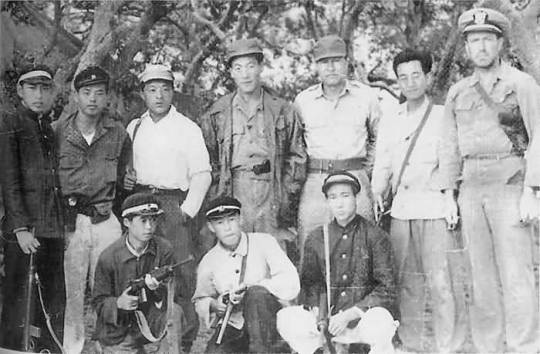
Inchon 1950: Operation "Trudy Jackson"
The Secrets Of Inchon, (2002) Commander Eugene Franklin Clark, USN
Two of Clark's men were Korean officers: a bilingual Navy Lieutenant, Youn Joung; and a former Korean counterintelligence officer, Colonel Ke In-Ju (기인주.) Both had served on General MacArthur's staff. Youn and Ke used the aliases...to try and mask the intelligence nature of the covert mission. Youn is standing at center with the pistol at his belt [Ke In-Ju next to him]...Clark brought Youn and Ke out to the McKinley with him, but most of the men in the above photo were probably caught and killed by the North Koreans, who also murdered 50 civilians at Yonghung-do who had helped the mission succeed.
Clark later took about 150 South Korean Guerillas, including Youn, on island-hopping forays all the way up to the Yalu. In October, Clark was able to notify Tokyo Headquarters that his agents had reported large numbers of Chinese were crossing the Yalu into North Korea.High Command evidently discounted this information. The belief that China would not intervene permeated Eighth Army leadership right down to the Battalion level and lower.”
(via Inchon 1950: Operation "Trudy Jackson" | Korean War Online)

“Aug. 25 - 1950 - The first major OPC operation, code named Trudy Jackson, is conducted by a US team led by 39-year old Lt. Eugene Clark of the US Navy. Clark was a Japanese linguist attached to MacArthur's G2. He is volunteered to lead an OPC team made of Lt. Youn Joung (ROK Navy), Col. Ke In Ju, (ROKA), a US Army captain, and 10 Korean agents trained by Tofte. Col. Ke was formally an intelligence officer who was fired by Rhee for his failure to predict the invasion.
August 28, 1950 - Hans Tofte flies Clark and the two Korean officers to an OPC camp at Sasebo. There they receive a quick lesson on covert operations and get teamed up a CIA radio team. Tofte gives Clark enough weapons, rice, dried fish, sugar, whiskey and gold bars to form a guerrilla army.”
“On Augst 31, 1950, the team boarded the British warship HMS Charity and left for Inchon. They were transferred to the S Korean warship PC-703 at the entrance of Flying Fish Channel. On Sept. 1, 1950, Lt. Clark and his team landed at Yonghong-do in preparation for the Inchon (14 miles from Yonghong) landing. Clark pressed some 50 islanders into scouting missions in Inchon. Informants called in the N Korean troops; the commandos escape to a nearby island of Palmi-do leaving behind the islanders. Those who helped the Americans were shot by the communists.”
(via Eyewitness: A North Korean Remembers | Young S Kim)

Colonel Ke In-Ju (기인주) was fired and imprisoned by Syngman Rhee for failing to warn of the pending North Korean invasion. Col. Ke In-Ju was replaced by USAF Capt. Donald Nichols as head of the future KCIA (the comparison to Lt. Kurtz from Francis Ford Coppola’s film Apocalypse Now is too kind, more accurately Nichols is Reinhard Heydrich [ SS-Obergruppenführer und General der Polizei SS/GESTAPO] reincarnated), for correctly predicting the North Korean invasion.
Ke In-ju recounts that he was rescued on the eve of the mass execution, by a U.S. Army captain who drew his pistol to coax the ROKA jailers to release custody. He was under orders from General MacArthur to bring back to Army Head Quarters in Tokyo, Col. Ke In-Ju, his former G-2 counterintelligence chief of staff, from the Taejon Prison where thousands of political adversaries to President Syngman Rhee were being held. Fortunately, Col. Ke In-Ju was rescued and spared execution, unfortunately a fellow family member, our Grandfather Kee (my father became fatherless at 11 y.o., as the son of the [mayor] of Kwangju, our family impoverished, the community stepped up and took care of our family with my father granted scholarships all the way through medical school), disappeared among the thousands killed by Syngman Rhee’s death squad at the Taejon Prison. After being rescued Colonel Ke In-Ju met with Gen. MacArthur in Japan and suggested the name “Operation Bluehearts” for the code name for the invasion of Inchon.

USN Lt. Eugene Clark operated a guerilla force of Korean partisans on the Yalu River, in which he is credited with providing a report to the CIC warning of a pending Chinese invasion, which was unfortunately discounted at the time. Clark like Hans Toft and other early CIA, accumulated large stashes of gold bars through the Korean War. Nichols operated a top secret North Korean currency counterfeiting operation, which was shut down by Syngman Rhee, who feared Kim Il Sung would retaliate by reciprocating and deflate the South Korean currency with counterfeit money, however there was no accounting of the secret warehouse full of cash. Hans Toft and other CIA leaders, built secret personal private islands with their newfound fortunes.
Clark and his special forces (future Navy SEAL) crossed into China to hold a village so that USAF Capt. Donald Nichols’, whose specially designed CIA “fishing boat”, was able to retrieve a downed MIG-15 (secretly flown by Russian aces) with the US Navy and Air Force providing cover support and Clark’s partisans holding back enemy ground forces. There is speculation that a cache of “Yamashira’s gold” was purportedly located by CIA agents, who clandestinely removed the “WWII war loot” before withdrawing under the guise of capturing a downed MIG-15 jet, which risks being misinterpreted by the Chinese as the start of an invasion by UN Forces, triggering a Chinese invasion in response.

Operation Chromite (film)
“Operation Chromite is a 2016 South Korean war drama film directed by John H. Lee and based on the real-life events of the Battle of Inchon, although it presents a fictionalized version of the historical CIA/US military intelligence operation "Trudy Jackson", conducted before the actual landing operation. It was released on 27 July 2016 in South Korea.”
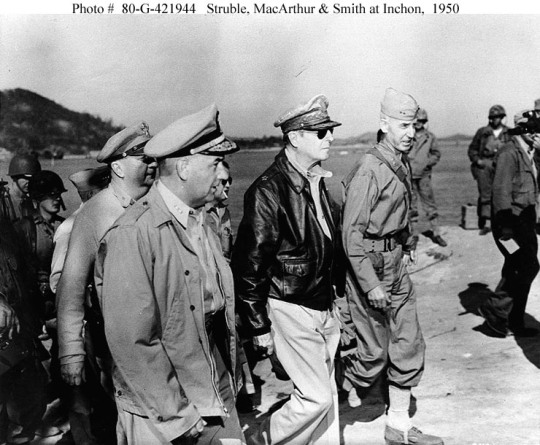
#operationbluehearts#operationchromite#operationtrudyjackson#CIAfirstwar#battleofinchon#eugeneclark#futurenavySEAL#donaldnichols#KCIAfather#syngmanrhee#1stkoreanpresident#keinju#기인주#chiefofcounterintelligence#koreanwarfilmtrilogy#bluehearts
0 notes